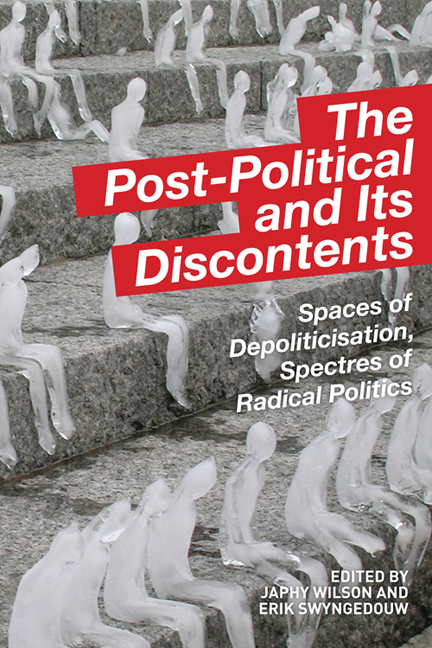Book contents
- Frontmatter
- Contents
- List of Contributors
- Seeds of Dystopia: Post-Politics and the Return of the Political
- Part I Spaces of Depoliticisation
- 1 The Post-Politics of Sustainability Planning: Privatisation and the Demise of Democratic Government
- 2 The Post-Political and the End of Nature: The Genetically Modified Organism
- 3 The New Development Architecture and the Post- Political in the Global South
- 4 Opening Up the Post-Political Condition: Multiculturalism and the Matrix of Depoliticisation
- 5 The Jouissance of Philanthrocapitalism: Enjoyment as a Post-Political Factor
- 6 Religious Antinomies of Post-Politics
- 7 Post-Ecologist Governmentality: Post-Democracy, Post- Politics and the Politics of Unsustainability
- Part II Spectres of Radical Politics
- There Is No Alternative
- Index
3 - The New Development Architecture and the Post- Political in the Global South
from Part I - Spaces of Depoliticisation
Published online by Cambridge University Press: 05 August 2016
- Frontmatter
- Contents
- List of Contributors
- Seeds of Dystopia: Post-Politics and the Return of the Political
- Part I Spaces of Depoliticisation
- 1 The Post-Politics of Sustainability Planning: Privatisation and the Demise of Democratic Government
- 2 The Post-Political and the End of Nature: The Genetically Modified Organism
- 3 The New Development Architecture and the Post- Political in the Global South
- 4 Opening Up the Post-Political Condition: Multiculturalism and the Matrix of Depoliticisation
- 5 The Jouissance of Philanthrocapitalism: Enjoyment as a Post-Political Factor
- 6 Religious Antinomies of Post-Politics
- 7 Post-Ecologist Governmentality: Post-Democracy, Post- Politics and the Politics of Unsustainability
- Part II Spectres of Radical Politics
- There Is No Alternative
- Index
Summary
Neoliberalism has fundamentally transformed development policy and practice in the Third World. This calls for new conceptual tools that move beyond earlier analyses of depoliticisation, anti-politics, alternative development and post-development. As many commentators have pointed out, neoliberalism is more than a set of economic policies aimed at eliminating trade barriers, promoting foreign investment and hollowing out the nation state. Rather, neoliberalism ‘reaches from the soul of the citizen-subject’ and ‘involves extending and disseminating market values to all institutions and social action’ (Brown 2003, emphasis in original). Drawing on Foucault's work on governmentality, Wendy Brown (2003) has argued that the distinctiveness of neoliberalism lies in the way democratic principles of freedom, rights and equality are merged so thoroughly with market rationality that an emancipatory politics appears hopeless and unjustified. She claims that neoliberalism cloaks itself in a liberal democratic discourse, while simultaneously dismantling democratic institutions and values. Brown concludes that this use and abuse of democracy confronts the Left with a fundamental paradox in developing an antidote to neoliberalism. While I am in broad agreement with Brown's analysis, this chapter argues that the analytics of neoliberal governmentality must be supplemented with a critique of the post-political in order to effectively engage with this paradox.
The chapter draws on empirical work in India to think through the ways in which post-politics is constitutive of the new development architecture in the ‘Global South’. The post-political conjuncture signals a new political formation in which democratic norms and practices have become central to sustaining the ideological complex of neoliberalism. This emphasis on the centrality of ‘democracy’ to neoliberal ideology sets post-political analysis apart from the literature on governmentality, according to which discourses of freedom, rights and choice are only a legitimating gesture of promarket regimes (Brown 2003: 27). The authoritarian capitalist state is assumed to be the ‘real’ face of neoliberalism, and insistence on democratic principles is seen as a mere rhetorical ‘shell’ that is disingenuous and ‘void of substance’ (Brown 2003: 11–15). Most critiques of development similarly argue that ‘democracy promotion’ by Western aid agencies is merely an illusion, a smokescreen for predatory capital in its global expansionary phase.
- Type
- Chapter
- Information
- The Post-Political and Its DiscontentsSpaces of Depoliticisation, Spectres of Radical Politics, pp. 67 - 85Publisher: Edinburgh University PressPrint publication year: 2014



